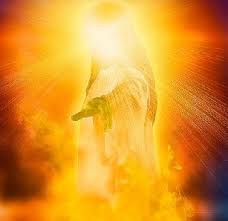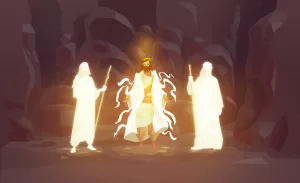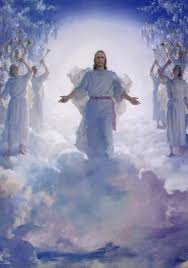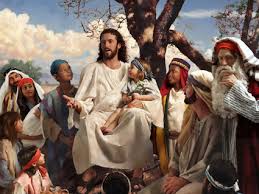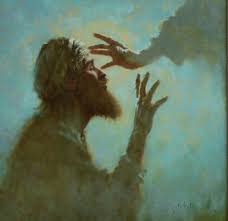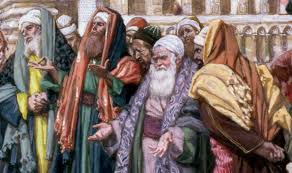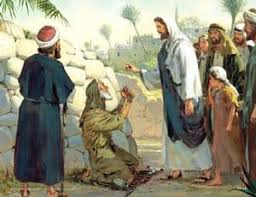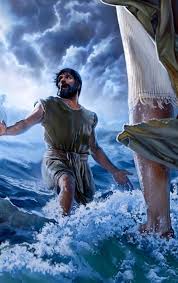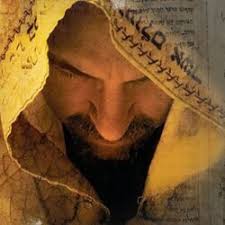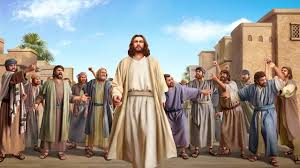Gd – Jesus Heals a Demon-Possessed Boy Mt 17:14-20; Mk 9:14-29; Lk 9:37-43a
Jesus Heals a Demon-Possessed Boy
Matthew 17:14-20; Mark 9:14-29; Luke 9:37-43a
Jesus heals a demon-possessed boy DIG: Where was Jesus when the nine apostles were trying to drive out the demon? How did this contribute to His frustration? As the boy’s father, how would you feel during the argument? How do the contrasts between this encounter and the transfiguration account for the Lord’s teaching? Why does Jesus heal the boy before the crowd reaches them? After the healing, what does Christ teach His apostles? What does the phrase: this kind . . . can only come out by prayer and fasting mean? What is the significance of this teaching?
REFLECT: When has a glorious mountain top experience in your life been followed by a depressing valley incident? Which builds up your faith more? In which areas of your life do you long to see more faith? Do you sometimes feel the same way as the boy’s father when he said: I do believe, but help me overcome my unbelief? What does that mean? Did he believe or not? What possibilities and what abuses come to mind when you think about the fact that everything is possible for one who believes?
The period of relative isolation was now coming to an end. Jesus had led the Twelve through the experiences of nearly six months, to a more intimate understanding of His nature and the true character of His Kingdom. He had brought them to a confession of their faith in His messiahship and divinity. Finally, Yeshua ha-Mashiach had taken the three best equipped and most spiritual of the apostles up on Mount Hermon for them to get a glimpse of His true nature so that they might have the courage to stand up under the persecution they would surely face in light of His coming crucifixion.
The scene shifts dramatically from the mountain of glory to the valley of despair. From the overwhelming splendor of the unveiled Messiah in the presence of Moses, Elijah, and God the Father, from a stunning preview of the Lord’s Second Coming, Yeshua and His three talmidim descended into the reality of the sinful world at its worst. It is not surprising, therefore, that the first tragic situation our Savior encountered upon returning from the mount of transfiguration was a lesson about faith.
The next day, when Jesus, Peter, James and John came down from the mountain, a large crowd met them in the vicinity of Caesarea Philippi. When they came to the other apostles, they saw a large crowd around them and the Torah-teacher arguing with them (Mark 9:14; Luke 9:37). Mark has a more complete account of this story than either Matthew or Luke, and the vivid details suggest the input of Peter’s eyewitness account. The Torah-teachers were arguing with the other nine talmidim who had been left behind, and a large crowd that had gathered. Since the transfiguration took place on Mount Hermon, the presence of the Torah-teachers so far north in Palestine indicated their concern in monitoring the teaching and preaching of the maverick Rabbi.884
The basis of the argument was that the nine talmidim had tried to drive out a demon, but they were unable to do so. This demonstrated that they still had much to learn. Thus, the Torah-teachers were using their failure as proof that Jesus was not the Messiah. It was kind of guilt by association. This was the hour of triumph for the Torah-teachers. The Master had refused the challenge in Dalmanutha (to see link click Fv – The Pharisees and Sadducees ask for a Sign), but, the apostles accepted it here, and had failed miserably.
This scene reminds us of Israel’s temptation in the wilderness (see my commentary on Exodus Gq – The Golden Calf Incident). We should hardly be surprised if the nine remaining talmidim who were left behind questioned Christ’s return, just as the Israelites questioned the return of Moses. When the people saw that Moses was so long in coming down from the mountain, they said: As for this fellow Moses who brought us up into Egypt, we don’t know what has happened to him (Exodus 32:1).
At that very moment, Jesus appeared with Peter, James and John. As soon as all the people saw Him, they were overwhelmed with wonder and ran to greet Him because He was now well known from Dan to Beersheba (Mark 9:15). He came, as always, unexpectedly, and at the most opportune time to provide an answer for the question at hand.
There was an immediate calm. Christ asked the nine remaining talmidim: What are you arguing with them about? But, before they could answer, a man in the crowd approached Yeshua and knelt before Him begging:Rabbi, have mercy on my son who is possessed by a demon that has robbed him of speech. The condition of the boy was pitiful and the father expressed a personal need (see En – Four Drastic Changes in Christ’s Ministry). He explained: Whenever it seizes him, he suffers greatly. It throws him to the ground and he often falls into the fires or into the water. He foams at the mouth, gnashes his teeth and becomes rigid (Matthew 17:14-15; Mark 9:16-18a). It was an extremely violent demon and seemed like a hopeless case.
The father had come in search of the Master Himself, but only found the nine apostles. Doubtless the nine had fully expected to be able to drive the demon out. Had that not been a part of their commission (Mark 3:15), and had they not already been successful at it (Mk 6:13)? He explained to the miracle working Rabbi, “I asked your talmidim to drive the demon out, but they could not heal him” (Mt 17:16; Mk 9:18b). What had gone wrong? Their failure was not due to the fact that Jesus wasn’t with them, because He had not been with them when they were previously successful. They still had the Lord’s promise of His power, yet they could not heal the boy. The reason for their failure was simple. They failed to use the power available to them.
The apostles’ faithless impotence not only grieved the boy’s father, but Yeshua as well. Speaking to the apostles and the large crowd rather than the man who had just confronted Him, the Lord answered perhaps as much to Himself as to them: You unbelieving and wicked generation, Jesus replied: how long shall I stay with you? How long shall I put up with you? Here the Galilean Rabbi gives us a rare glimpse into the depths of His human emotion and divine soul. Having been accustomed from eternity past to having the angels instantly do His bidding, He was grieved at the spiritual blindness of ADONAI’s people, Isra’el, especially His apostles, whom He had personally chosen, taught, and empowered with unique power and authority. The entire generation of Israelites were faithless; represented on this occasion by the large crowd, the talmidim, and the self-righteous Torah-teachers who were there to trap and discredit the Lord if they could.885

The next moment Christ turned to the father and said: Bring your son here to Me. Here the deadly conflict between the Lord and demonic powers is clearly seen. Even while the boy was coming, when the demon saw Jesus, it immediately threw him to the ground in a convulsion. He fell to the ground and rolled around, foaming at the mouth (Matthew 17:17; Mark 9:19-20; Luke 9:41-42a). What a sad spectacle it was!
Messiah asked the boy’s father: How long has he been like this? From childhood, he answered. It has often thrown him into fire or water to kill him. When the father left home to bring his son to Yeshua’s apostles, he apparently believed his son could be healed. But, now he was not so sure and hopefully said: But if you can do anything, take pity on us and help us (Mark 9:21-22). He didn’t doubt the Lord’s ability, but rather His willingness. Was He stronger than His talmidim? He would soon find out.
If I can do anything? Jesus immediately turned the question around. The question was not if the Creator who spoke the world into existence could do anything. The question was did the father have enough faith! Everything is possible for one who believes. Due to the changes in Christ’s ministry after His rejection, Yeshua needed a demonstration of faith. Immediately the boy’s father exclaimed: I do believe; I want to believe. But he recognized that his faith was far from perfect. It was still mixed with unbelief. So he pleaded, please help me overcome my unbelief (Mark 9:23-24)! The father’s statements are not as contradictory as they may seem because we all have experienced questions about the depth of our faith from time to time.
Jesus saw that a crowd was running to the scene. The mention of a crowd running to the scene seems strange in view of Mark 9:14, which states that a large crowd was already there. No mention is made of the large crowd leaving so we must assume that the crowd here is in addition to the first one.
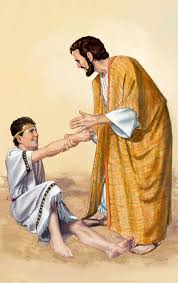
Once again, due to the changes in Christ’s ministry after His rejection, miracles were not meant to convince the masses that He was the Messiah. So Yeshua performed this miracle before the crowd arrived. He rebuked the deaf and mute spirit by saying: I command you, come out of him and never enter him again. The demon realized that it was going to be driven out and made one last attempt to destroy the boy; the demon shrieked, convulsed him violently and came out of him. The man’s son was healed at that very moment (Matthew 17:18; Mark 9:25-26a; Luke 9:42b). Mark’s account also included an echo of the resurrection. The boy looked so much like a corpse that many thought He was dead. But Jesus took him by the hand, lifted him to his feet, and as he stood up the Lord gave the boy back to his father. And they were all amazed at the greatness of God (Mark 9:26b-27: Luke 9:43). This healing should not be interpreted as a guarantee of healing for all followers of Yeshua. We cannot play God and demand that He heal us because the Messiah Himself endured great pain and suffering in order to fulfill His calling. However, the healing of this physical condition and demon possession is a beautiful example of Christ’s power in this specific case.
His apostles must have been both amazed and perplexed, for after Jesus had gone indoors, they came to Him privately and asked: Why couldn’t we drive out the demon? There are two basic reasons Christ gives. First, He replied: Because you have so little faith. Apparently they had taken the power given them or had come to believe that it was inherent in themselves. So they no longer depended prayerfully on God for it, and their failure showed their lack of prayer. Notice that it was the apostles who lacked faith – not the man. The second reason was that that kind of a demon could only come out by prayer and fasting (Matthew 17:19-20a; Mark 9:28-29 NKJV).
When Jesus said: This kind . . . can only come out by prayer, what kind was He talking about? It was a spirit that had robbed the boy of his speech (Mark 9:17). In other words, it was a mute demon (see Ek – It is only by Beelzebub, the Prince of Demons, that This Fellow Drives out Demons)! Jesus verified that the driving out of a mute demon was very different. The Pharisees could drive out many kinds of demons, but not a mute demon! Later, at the great white throne judgment those like them would say: Lord, Lord, did we not drive out demons in your name (Matthew 7:22)? Up to now the talmidim would simply drive out demons in Jesus’ name. That was the only method the Twelve needed to use. But, a mute demon was different. They couldn’t just drive it out . . . they had to pray it out.
To emphasize His point, Jesus shared an amazing truth of the Kingdom. In order to experience some of the God’s great power, a person doesn’t need to be a great spiritual giant. Surprisingly, He continued, saying: Truly I tell you, if you have faith as small as a mustard seed, you can say to this mountain, “Move from here to there,” and it will move. Nothing will be impossible for you (Matthew 17:20b). Whenever the word mountain is used symbolically, it is always the symbol of a king, kingdom or throne. The kingdom they just encountered was the kingdom of Satan.
The lesson should be as clear to us today as it was to His apostles then. Even with a small amount of faith on our part, God can accomplish great things. The teaching was even more striking in the context of this encounter, as the three talmidim had just descended from the tallest mountain in Isra’el, Mount Hermon. From the smallest seed of spiritual faith even this mountain (the kingdom of the Adversary) could potentially be moved.
Yeshua even expanded the possibilities by emphasizing that nothing will be impossible for those who possess such faith. Once again, however, we must be careful to avoid interpreting more in a passage than is allowed by the context of the whole Bible. This statement is not license to impose our own foolish ideas over the mandate of God Himself. In another context Jesus said: You may ask me for anything in my name, and I will do it (John 14:14). It is not a blank check for our own desires, but answers will come, assuming we ask it according to God’s will – as Jesus Himself modeled for us when He prayed: Father, if You are willing, remove this cup from Me; yet not My will, but Yours be done (Luke 22:42 NASB). Nonetheless, the mustard seed promise is beautiful and amazing in that it teaches us that incredible things are possible if we trust in Messiah’s power and submit to His will in our lives.886 There are two lessons for us here:
First, Jesus was not only ready to face the Cross, He was also ready to face common problems of everyday people. It is a characteristic of human nature that we can face the great crisis moments in our lives with honor and dignity, but, we allow the routine demands of everyday life to irritate, distract and annoy us. We can face the shattering blows of life with a certain heroism, but, we allow the petty pinpricks to upset us. Many of us can face a great loss in our family with a calm serenity and yet lose our temper if our service at a restaurant is bad or a bus is late. The amazing thing about Jesus was that He could serenely face the cross, and at the same time just as calmly deal with the day-to-day emergencies of life. But, He did not keep God behind glass, reserved just for emergencies like so many of us do. No, He walked the daily paths of life with God the Father.
Second, Messiah came into the world to save the world, and yet, He could give His full and undivided attention to help one single person. It is much easier to preach the Gospel of love for the whole world than it is to love single, individual, unlovable sinners. It is easy to be filled with affection for broad humanitarian causes, and just as easy to find some excuse not to help one person in need. Yeshua had the ability to give Himself fully to every person with whom He happened to be at the time.887
Do you have a burden in your life? Do you have a spiritually sick child? A physically sick spouse? An emotionally sick friend? Do you have financial problems? Do the trials of this life seem so overwhelming at times you just don’t know if you can go on another day? Whatever the problems are in your life, you can hear Jesus say: Bring your [burdens] here to Me.




